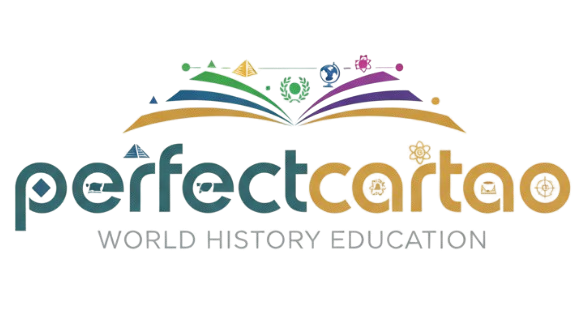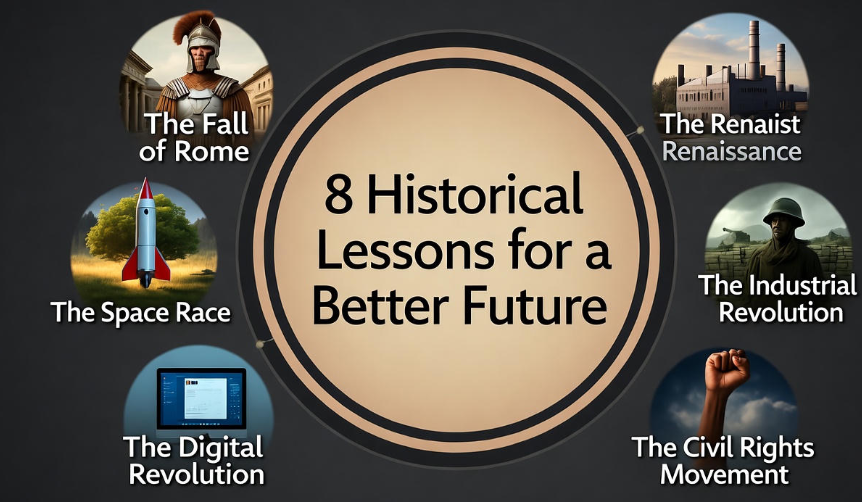History is full of lessons. Every century, people faced challenges, made mistakes, and discovered new ways to move forward. The beauty of history is that it doesn’t just tell us what happened — it shows us why it happened and how we can avoid repeating the same mistakes.
So, if we look back wisely, we can actually shape a better future. Let’s explore eight timeless lessons from history that still hold powerful meaning today.
1. The Rise and Fall of Empires — Nothing Lasts Forever
Every great empire, from Rome to the British Empire, started with ambition and innovation but eventually collapsed. Why? Mostly because of greed, corruption, and ignoring the needs of the people.
History reminds us that power without humility never lasts. Whether it’s a government, company, or individual, those who forget empathy and overreach always fall sooner or later.
In modern life, this lesson applies to everything — politics, business, and even personal success. When we become too confident and stop listening, decline begins. A sustainable future depends on balance, fairness, and remembering that no one stays at the top forever.
| Empire | Peak Period | Reason for Decline |
|---|---|---|
| Roman Empire | 27 BC – 476 AD | Corruption, overexpansion, invasion |
| Ottoman Empire | 1299 – 1922 | Internal conflict, modernization failure |
| British Empire | 1583 – 1945 | Colonial resistance, economic strain |
2. The Dark Ages and Renaissance — Learning Always Brings Light
After the fall of Rome, Europe entered the “Dark Ages.” Knowledge was limited, progress slowed, and creativity faded. But then came the Renaissance, an explosion of art, science, and human spirit.
The message is simple: education and curiosity drive progress. When societies stop learning, they stop growing.
Today, investing in education and open thinking is just as important. The internet age gives us more tools than ever — but it’s our responsibility to use them to enlighten, not divide. Learning something new every day keeps not just individuals but entire nations alive and thriving.
3. The Industrial Revolution — Innovation Must Be Balanced with Care
The Industrial Revolution changed the world. Machines replaced manual labor, cities grew fast, and economies boomed. But it also brought pollution, harsh labor conditions, and inequality.
Here’s what history teaches: progress without compassion can cause destruction.
In our time, we face similar issues — like climate change, AI ethics, and worker exploitation. The past tells us we must innovate responsibly.
Let’s take a lesson from those early factories: technology should help people, not harm them. Profit should never come before people or the planet.
| Problem | Industrial Revolution Example | Modern Equivalent |
|---|---|---|
| Pollution | Factory smoke, river waste | Climate change |
| Labor Abuse | Child labor, long hours | Low wages, burnout |
| Rapid Urbanization | Overcrowded cities | Housing crises |
4. World Wars — Peace Is Priceless
The 20th century saw two devastating world wars that claimed millions of lives. These wars showed the worst of human pride, hate, and greed — but also the best of courage, unity, and hope.
The biggest lesson? Peace should never be taken for granted.
After World War II, the world built organizations like the United Nations to promote cooperation and avoid such global tragedy again. While conflict still exists, history shows us that communication and empathy save far more lives than weapons ever will. ️
As individuals, we can follow this too — whether it’s in relationships, workplaces, or communities, choosing peace over ego always leads to a better outcome.
5. The Civil Rights Movements — Equality Needs Courage
From Martin Luther King Jr. in the U.S. to Nelson Mandela in South Africa, history shows that standing up for what’s right often takes great sacrifice.
Oppression and injustice may seem unbeatable, but people with courage and hope always lead the way to change.
This teaches us that silence helps the oppressor, not the victim. Whether it’s racial, gender, or social inequality — progress begins when people speak up.
Even today, we see movements for equality, environmental justice, and workers’ rights. The key is persistence. Change doesn’t come overnight, but history proves it always comes when people unite for fairness.
6. The Fall of the Berlin Wall — Unity Is Stronger Than Division
When the Berlin Wall fell in 1989, it didn’t just mark the end of separation between East and West Germany — it symbolized freedom.
Walls may keep people apart, but hope and unity always find a way. The world learned that humans naturally want connection, not control.
In today’s digital age, where misinformation and politics create invisible “walls” between people, we can learn from Berlin: real strength lies in building bridges, not barriers.
Let’s replace arguments with understanding, borders with cooperation, and fear with compassion.
7. The Global Pandemics — Preparedness and Empathy Save Lives
From the Black Death in the 1300s to COVID-19 in recent years, pandemics have shown how fragile life can be — and how deeply connected we all are.
One lesson repeats every time: preparedness matters, but empathy matters even more.
During COVID-19, we saw the power of global science and cooperation — vaccines were developed at record speed. But we also saw fear, misinformation, and division.
If we look back, we realize that in every crisis, those who acted with compassion and science-led thinking saved the most lives. Future generations must remember: kindness and knowledge are our best shields.
| Pandemic | Century | Lesson |
|---|---|---|
| Black Death | 14th | Hygiene, medical research |
| Spanish Flu | 20th | Communication, transparency |
| COVID-19 | 21st | Global cooperation, empathy |
8. The Digital Revolution — Use Technology Wisely
The internet, smartphones, and AI have made life easier but also more complicated. Information spreads in seconds, but so do lies. People connect globally but often feel lonelier than ever.
History hasn’t ended — we’re writing it right now. This era’s big test is how we use technology. Will it make us smarter and kinder, or more divided and distracted?
If we’ve learned anything from the past, it’s this: power must come with responsibility. Just as the printing press once changed knowledge forever, the digital age can reshape truth — for better or worse.
So, the next time we post, share, or create online, let’s ask: “Does this make the world better?” Because our actions today will be tomorrow’s history. ✨
-
Explore next: 8 Ancient Traditions That Still Exist Today
A Quick Summary Table
| Historical Period | Main Lesson | Modern Application |
|---|---|---|
| Ancient Empires | Power fades without humility | Stay grounded and fair |
| Renaissance | Knowledge leads progress | Keep learning |
| Industrial Revolution | Innovation needs ethics | Use tech responsibly |
| World Wars | Peace is priceless | Choose cooperation |
| Civil Rights Era | Courage changes history | Stand for equality |
| Berlin Wall Fall | Unity wins over division | Build bridges |
| Global Pandemics | Empathy saves lives | Help and prepare |
| Digital Revolution | Power demands responsibility | Use tech for good |
Final Thoughts
History isn’t just about the past — it’s a mirror for the future. The stories of courage, mistakes, and discoveries are all reminders that we hold the power to shape what comes next.
The world doesn’t need to repeat its worst moments. If we learn from history’s lessons — humility, compassion, knowledge, and unity — then our future can be brighter than any empire or invention ever created.
So, as we move forward, let’s ask ourselves:
-
Are we learning from yesterday?
-
Are we acting wisely today?
-
And are we building a future we’ll be proud of tomorrow?
Because in the end, history isn’t written by time — it’s written by us.

FAQs
Q1: Why is it important to learn from history?
Because it helps us avoid repeating the same mistakes. History shows us what worked and what failed, guiding us toward smarter choices for the future.
Q2: Can ordinary people make a difference like historical figures did?
Absolutely! Every movement or change started with ordinary people who decided to act. Small steps from many people create big change.
Q3: What is the most important lesson history teaches us?
That nothing is permanent — power, wealth, and control fade. What lasts is kindness, knowledge, and the impact we leave on others.
Q4: How can students use historical lessons in daily life?
By staying curious, questioning everything, respecting others’ perspectives, and never being afraid to stand up for what’s right.
Q5: How does technology fit into historical lessons?
Technology is just another kind of revolution — like the printing press or the steam engine. It must be used wisely, with responsibility and empathy.




